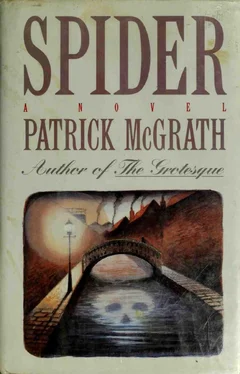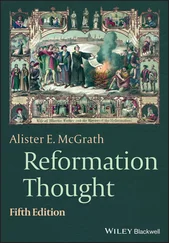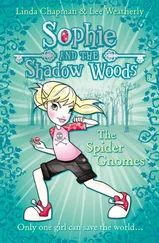When he was in this frame of mind—and drinking only made things worse, drinking broke down his reserve—mealtimes were hell. I would sit at the kitchen table gazing at the ceiling, where an unshaded bulb dangled on the end of a braided brown cord. I tended always to slip into reverie in that poky little kitchen, with its clanging pots and dripping tap and ever-present smell of boiling cabbage, it made those ghastly meals tolerable. Outside the twilight darkened into night, and from over by the railway embankment came the scream of a whistle as some suburban train went steaming by. My mother put in front of me a plate of boiled potatoes, boiled cabbage, and stewed neck of mutton, the meat coming away from the bone in stringy grayish patches. There was a terrible tension in the room as I picked up my knife and fork. I knew my father was watching me, and this made things worse, for I was a clumsy boy at the best of times, only poorly in control of those long, gangling limbs of mine. I stuffed a large lump of potato in my mouth, but it was too hot so I had to cough it back onto my plate. “For Christ’s sake —!” he hissed between clenched teeth. My mother glanced at him, her own fork poised over a potato that sat like a plug in a greasy puddle of thin gravy. “Don’t lose your temper,” she murmured, “it’s not the boy’s fault.”
The meal progressed in painful silence. There were no further train noises from over by the railway embankment, nor was there anything moving on Kitchener Street. Cutlery clattered on cheap china as we ate our neck of mutton and the tap dripped into the sink with a steady plop plop plop. The bulb overhead continued to spread a sickly yellow light over the room, and having devoured my food I sat once more gazing at the ceiling with my lips faintly moving, pausing only to pick at a shred of mutton caught between my teeth. “Put the kettle on then, Spider,” said my mother, and I rose to my feet. As I did so I banged one of my kneecaps against the side of the table, jarring it violently such that my father’s plate moved several inches to the left. I felt him stiffen then, I felt his grip tighten on his fork, onto the end of which he had just scraped a soggy pile of pale limp cabbage; but mercifully he said nothing. I lit the gas. At last he finished eating, laid his knife and fork across the middle of his plate, placed his hands on the edge of the table, elbows arched outward at a sharp angle, and prepared to get up from the table. “Off down the pub, I suppose,” said my mother, still at work on her last potato, which she had cut into a number of very small pieces, and without lifting her eyes to my father’s face.
I cast a quick fearful glance at him; and in the way his jaw worked I knew what he thought of the pair of us, his gangling, useless son and his mutely reproachful wife, who sat there making little pokes and stabs at her potato and refusing to meet his eye. He took his cap and jacket from the hook on the back of the door and went out without a word. The kettle came to the boil. “Make us a nice cup of tea then, Spider,” said my mother, rising from her chair and brushing at her cheek as she began to gather the dirty plates.
♦
Later I would go up to my bedroom, and I think I should tell you about that room, for so much of all this is based on what I saw and heard, and even smelled, from up there. I was at the back of the house, at the top of the stairs, and I had a view of the yard and the alley beyond. It was a small room, and probably the dampest in the house: there was a large patch on the wall opposite my bed where the paper had come away and the plaster beneath had started literally to erupt— there were crumbly, greenish lumps of moist plaster swelling from the wall, like buboes or cankers, that turned to powder if you touched them. My mother was constantly at my father to do something about it, and though he’d replastered the wall once, within a month they were back, the problem being leaky drainpipes and decaying mortar in the brickwork, all of which my mother thought he should be able to fix but which he never had. I would lie awake at night and by whatever moonlight penetrated the room I would gaze at these shadowy lumps and nodules, and in my boyish imagination they became the wens and warts of some awful humpbacked night-hag with an appalling skin disease, a spirit damned for her sins against men to be trapped, tormented, in the bad plaster of an old wall in a slum. At times she left the wall and entered my nightmares (I was plagued by nightmares, as a boy), and then when I woke in the night in terror I would see her sneering in the corner of the room, turned away from me, her head cloaked in shadow and her eyes glittering from that horrible knobbly skin, the smell of her breath befouling the air; then I would sit up in bed, screaming at her, and it was only when my mother came in and turned the light on that she returned to her plaster, and I would then have to have the light on for the rest of the night.
As for school, I was never happy there, and I tried to avoid the place as much as I could. I had no friends, I didn’t want any friends, I didn’t like any of them, and over the years they’d learned to leave me alone. I shudder to think of those days, even now: there were long rows of desks in a vast, high-ceilinged barn of a classroom with wooden floorboards, and sitting at each desk a bored child with a pencil and an exercise book. I was at the back of the row closest to the windows, which were set high in the wall so I could not gaze off into space and escape the tedium, and through those windows streamed the light of the day, and in it there was a constant thick drift and swirl of dust. The effect of dust dancing in sunlight has always for me been soporific, doubly so when there came from the front of the room the dull flat weary tones of some disaffected teacher in a shabby suit and heavy leather shoes who paced back and forth in front of the blackboard—a distant world, dusty eons from my own— interrupting himself to chalk up a word, or some numbers, the chalk scraping on the board with a hideous screech that had the pupils squirming, and the dust swirled as they shuffled on the floorboards with their shoes, and your Spider drifted further and further away, further into the back parts of his mind where no one could follow. Rarely was I called upon in class to answer a question; other boys and girls were better at that than I was, confident clever children who could rise smartly to their feet and tell the teacher what he wanted to hear. These children sat at the front of the classroom, closest to the blackboard; back here in the netherlands was where the “slower” children sat, a fat boy called Ivor Jones who was less popular even than me and was made to cry in the playground every day as a matter of routine, and a very messy girl named Wendy Wodehouse whose nose was always running with snot, and whose dress was always filthy, and who smelled, and who craved affection so avidly that she’d pull her knickers down behind the toilets if you asked her, and there were rumors she did other things as well. These were my closest neighbors at the back of the class, Ivor Jones and Wendy Wodehouse, but there was no sort of alliance possible between us, in fact we hated each other more bitterly than the other children hated us, because to each other we presented an image of our own pathetic isolation. I doubt I was missed when I stopped going to school; there would have been a neat line of absents in the register, and one less set of homework to mark. Nobody cared.
On Saturday nights my mother and father always went to the pub together. From my bedroom window, where I sat with my elbows on the sill and my chin in my hands, I’d see them leave through the back door and go down the yard, then through the gate and into the alley. They always sat at the same small round table in the public bar, close to the fireplace. They didn’t have a great deal to say to one another; from time to time my father went up to the bar, and the landlord, a man called Ratcliff, served him. “Same again, is it, Horace?” he’d say, and my father would nod, his cigarette between his lips as he fumbled for change in his trousers.
Читать дальше












